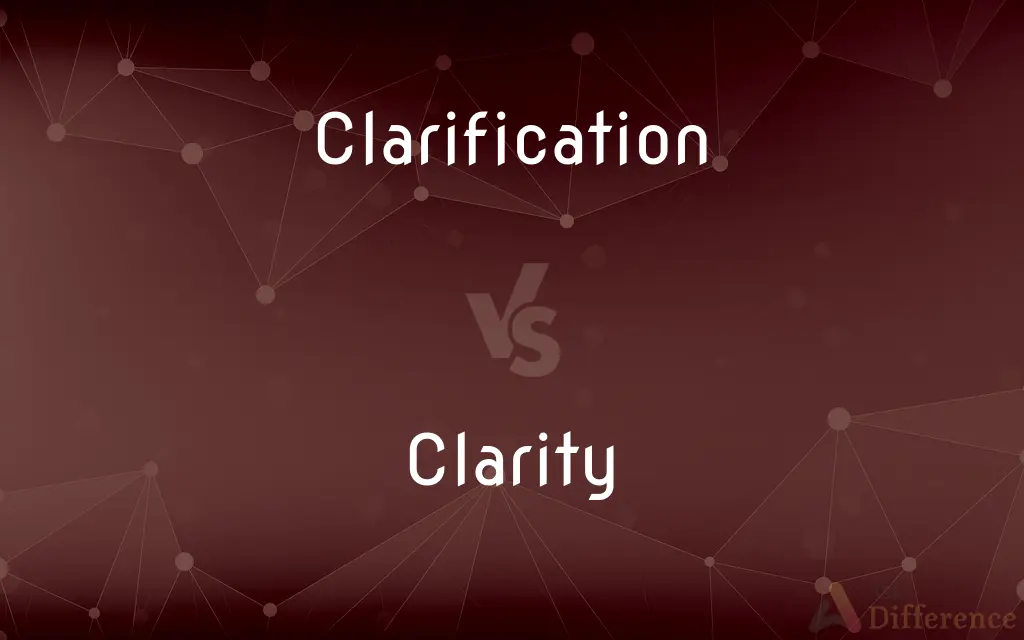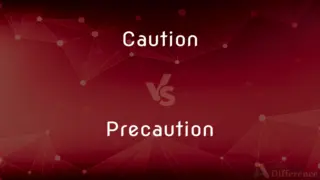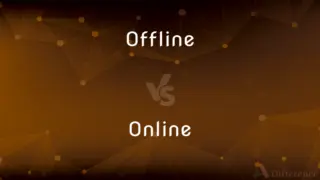Clarification vs. Clarity — What's the Difference?
By Tayyaba Rehman — Updated on October 16, 2023
Clarification is the act of making something clear or understandable, while clarity refers to the quality of being clear or easy to understand. Both terms center around the concept of clear comprehension but from different perspectives.

Difference Between Clarification and Clarity
Table of Contents
ADVERTISEMENT
Key Differences
Clarification, as a noun, points to the action of making a concept, statement, or idea more transparent or comprehensible. When one seeks clarification, they're asking for additional information or an explanation to better grasp something. On the contrary, clarity is the inherent quality or state of being clear in expression, thought, or presentation. It doesn't imply an action but a condition or characteristic.
In communication, when a statement is ambiguous or vague, a listener might request clarification to ensure they've understood the message correctly. The speaker, in response, would provide additional details or rephrase their statement. Clarity, meanwhile, would mean that the initial message was conveyed lucidly from the start, minimizing the chance of misunderstandings.
When dealing with complex subjects or ideas, clarification is the process of breaking down intricate details into more digestible bits or explaining them in simpler terms. This process aids in achieving clarity, where the subject becomes transparent and easily understood by the audience.
In written content, authors might provide footnotes, definitions, or explanatory segments as a means of clarification for potentially perplexing terms or concepts. However, a piece written with clarity would be inherently easy to follow, with ideas flowing logically and language being straightforward.
Imagine a foggy window. Clarification would be the act of wiping away the fog to see through it, while clarity describes a window that's already clean and transparent, offering an unobstructed view from the get-go.
ADVERTISEMENT
Comparison Chart
Nature
Action or process.
Quality or state.
Purpose
To make something clear or understandable.
Inherent clearness or lucidity.
Usage
In response to ambiguity or confusion.
Describes clearness from the outset.
Associated With
Explanation, elaboration, or detail.
Transparency, lucidity, and simplicity.
Grammatical Role
Often used as a noun indicating an action.
Typically a noun indicating a condition.
Compare with Definitions
Clarification
An explanation that makes something more comprehensible.
I asked for clarification regarding the project's objectives.
Clarity
Distinctness in expression or presentation.
The photograph was praised for its clarity.
Clarification
The act of removing ambiguity or confusion.
The document included a clarification of technical terms.
Clarity
Lucidity in thought or articulation.
The lecturer spoke with clarity on the complex topic.
Clarification
Making unclear aspects of a statement evident.
The manager sought clarification on the deadline.
Clarity
The state of being coherent and free from obscurity.
The clarity of the instructions ensured smooth assembly.
Clarification
A detailed breakdown of complex ideas.
The teacher provided clarification for the complicated equation.
Clarity
The quality of being coherent and intelligible
For the sake of clarity, each of these strategies is dealt with separately
Clarification
The action of making a statement or situation less confused and more comprehensible
The remaining changes are small clarifications
Please advise us if you require further clarification
Clarity
The quality of transparency or purity
The crystal clarity of water
Clarification
To make clear or easier to understand; elucidate
Clarified her intentions.
Clarity
Clearness of appearance
The clarity of the mountain air.
Clarification
To clear of confusion or uncertainty
Clarify the mind.
Clarity
Clearness of thought or style; lucidity
Writes with clarity and perception.
Clarification
To make clear by removing impurities or solid matter, as by heating gently or filtering
Clarify butter.
Clarity
The state or measure of being clear, either in appearance, thought or style; lucidity.
She dreamed with great clarity.
The brilliant clarity of his argument could not be faulted.
Clarification
To become clear.
Clarity
The ability to be easily understood.
Lack of clarity on the part of the teacher will cause confusion among the students.
Clarification
The act of clarifying; the act or process of making clear or transparent by freeing visible impurities; particularly, the clearing or fining of liquid substances from feculent matter by the separation of the insoluble particles which prevent the liquid from being transparent.
The clarification of wine.
Clarity
Clearness; brightness; splendor.
Floods, in whose more than crystal clarity,Innumerable virgin graces row.
Clarification
The act of freeing from obscurities.
Your ideas deserve clarification.
Clarity
Free from obscurity and easy to understand; the comprehensibility of clear expression
Clarification
The act or process of making clear or transparent, by freeing visible impurities; as, the clarification of wine.
Clarity
The quality of clear water;
When she awoke the clarity was back in her eyes
Clarification
The act of freeing from obscurities.
The clarification of men's ideas.
Clarity
The quality of being transparent or easily understood.
The clarity of her writing impressed the editor.
Clarification
An interpretation that removes obstacles to understanding;
The professor's clarification helped her to understand the textbook
Clarity
Absence of ambiguity or confusion.
He explained his plans with remarkable clarity.
Clarification
The act of removing solid particles from a liquid
Clarification
Elaboration or additional information to ensure understanding.
She sent a follow-up email for further clarification.
Common Curiosities
Can a text have clarity without needing clarification?
Yes, a text with inherent clarity won't require additional clarification.
Is clarity always preferable in communication?
Generally, yes. Clarity minimizes misunderstandings and ensures effective communication.
If I ask for clarification, does it mean the message lacked clarity?
Often, yes. Seeking clarification typically arises from a lack of clarity in the original message.
Is clarity subjective?
To some extent, yes. What's clear to one person might not be for another, depending on their background knowledge.
How can I ensure clarity in my writing?
Use straightforward language, structure ideas logically, and avoid jargon unless defined.
What's the main difference between clarification and clarity?
Clarification is the act of making clear, while clarity is the quality of being clear.
Can clarification lead to more confusion?
If not done well, yes. Poorly provided clarification can further muddle the message.
Is seeking clarification a sign of not understanding?
Yes, it often indicates a need for further information or understanding.
Does clarity only pertain to language?
No, clarity can relate to visuals, sounds, or any medium where clear understanding is crucial.
Does clarity always eliminate the need for clarification?
Ideally, yes, but individual understanding varies, so some might still seek clarification.
Can a clarification ever reduce clarity?
If poorly provided or overly complex, clarification can sometimes complicate understanding.
Which is more passive, clarity or clarification?
Clarity is more passive, being a quality, while clarification is an active process.
Can a document have sections with clarity and others needing clarification?
Absolutely. Parts of a document might be clear, while others may be ambiguous or complex.
Share Your Discovery

Previous Comparison
Caution vs. Precaution
Next Comparison
Offline vs. OnlineAuthor Spotlight
Written by
Tayyaba RehmanTayyaba Rehman is a distinguished writer, currently serving as a primary contributor to askdifference.com. As a researcher in semantics and etymology, Tayyaba's passion for the complexity of languages and their distinctions has found a perfect home on the platform. Tayyaba delves into the intricacies of language, distinguishing between commonly confused words and phrases, thereby providing clarity for readers worldwide.















































